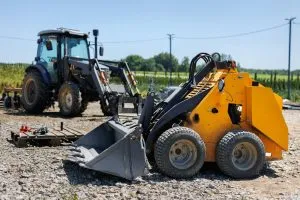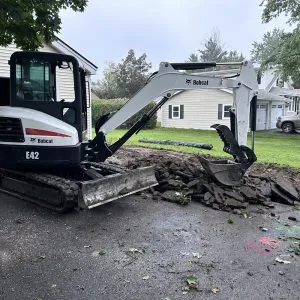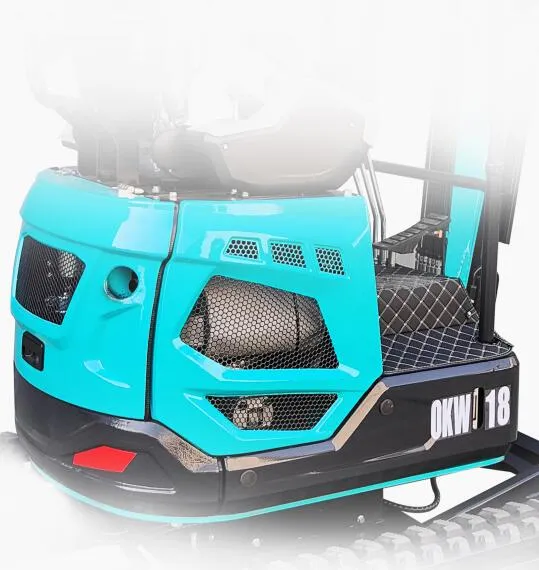Renting out mini excavators can be a lucrative business venture, especially given the rising demand for construction, landscaping, and small-scale excavation projects. These compact yet powerful machines are essential tools in many industries, making them highly sought after by contractors, landscapers, and even homeowners for various tasks. If you own a mini excavator or are considering purchasing one, this guide will walk you through how to make money by renting it out. We’ll cover everything from setting up your rental business to marketing, pricing strategies, and maintaining your equipment.

1. Introduction to Mini Excavator Rentals
Mini excavators are versatile and powerful pieces of machinery used for digging, trenching, landscaping, demolition, and various other construction-related activities. Their compact size allows them to work in tight spaces, making them ideal for both large and small projects. As a result, there’s a steady demand for mini excavator rentals across multiple sectors. Renting out a mini excavator can provide a substantial income stream, especially if you target the right markets and manage your operations effectively.
2. Why Renting a Mini Excavator is Profitable
Renting out mini excavators can be highly profitable for several reasons:
- High Demand: Mini excavators are needed for various projects ranging from residential landscaping to commercial construction. This diverse demand ensures a broad customer base.
- Low Operating Costs: Compared to larger equipment, mini excavators have lower operating and maintenance costs, which increases profit margins.
- Flexibility: Mini excavators can be rented for short-term or long-term projects, offering flexible pricing structures and rental periods.
- Residual Value: These machines hold their value well over time, meaning you can eventually sell them after a few years of rentals and recoup a significant portion of your initial investment.
3. Steps to Start a Mini Excavator Rental Business
Starting a mini excavator rental business requires careful planning and strategic decision-making. Here’s a step-by-step guide:
a. Market Research and Business Planning
Before diving into the rental business, it’s essential to conduct thorough market research. Identify your target market—whether it’s local contractors, landscapers, or homeowners—and understand their needs. Analyze the competition in your area to determine your unique selling proposition (USP).
Business Planning: Develop a detailed business plan that outlines your goals, target market, pricing strategy, and projected financials. Your plan should also include a marketing strategy and an operational plan detailing how you’ll manage the rentals, maintain equipment, and handle customer service.
b. Legal Considerations and Business Setup
Setting up your business legally is crucial to avoid future complications. Here are the steps:
- Choose a Business Structure: Decide whether to operate as a sole proprietorship, partnership, LLC, or corporation. Each structure has different tax implications and liability protections.
- Register Your Business: Register your business name with your local government and obtain the necessary licenses and permits.
- Compliance: Ensure your business complies with local, state, and federal regulations regarding heavy equipment rental.
c. Purchasing the Right Mini Excavator
Investing in the right mini excavator is key to your business’s success. Consider the following when purchasing:
- Brand and Model: Opt for reliable brands known for durability, such as Caterpillar, Bobcat, or Kubota.
- Size and Capabilities: Choose a model that is versatile enough to handle various tasks but still compact enough to fit into tight spaces.
- Attachments: Invest in a variety of attachments (e.g., buckets, augers, breakers) to increase the machine’s utility and rental appeal.
Consider buying used equipment if you’re starting on a budget, but ensure it’s in good condition with a clear maintenance history.

4. Setting Up Your Rental Business Operations
Once you’ve purchased your equipment, the next step is setting up the operational aspects of your rental business.
a. Rental Agreement and Terms
A solid rental agreement is crucial to protect your business and clarify the terms of use for your customers. Your agreement should cover:
- Rental Duration: Clearly state the rental period, including start and end times.
- Payment Terms: Specify the rental rate, payment method, and due dates.
- Damage and Liability: Outline the renter’s responsibilities for any damages or loss of equipment and include a liability waiver.
- Insurance Requirements: Detail any insurance requirements the renter must meet.
It’s advisable to consult with a legal professional to draft a comprehensive rental agreement.
b. Insurance Requirements
Insurance is vital to protect your business and equipment. Consider the following types of insurance:
- General Liability Insurance: Covers third-party injuries and property damage.
- Equipment Insurance: Protects against damage, theft, or loss of your mini excavator.
- Rental Insurance: Provides coverage during the rental period, often required by the customer.
c. Maintenance and Repairs
Regular maintenance is crucial to keep your mini excavator in top condition and minimize downtime. Set up a maintenance schedule based on the manufacturer’s recommendations, including regular oil changes, filter replacements, and inspections.
Repairs: Have a plan in place for quick repairs in case of breakdowns. Partnering with a local mechanic or dealership for service can ensure your equipment is back in operation quickly.
5. Pricing Strategies for Renting Out Mini Excavators
Setting the right price is critical to attracting customers while ensuring profitability. Consider the following when determining your rental rates:
- Market Rates: Research local rental rates for similar equipment to stay competitive.
- Cost Recovery: Ensure your pricing covers your initial investment, maintenance, insurance, and other operational costs.
- Rental Duration: Offer tiered pricing based on rental duration. For example, offer daily, weekly, and monthly rates with discounts for longer rentals.
- Seasonal Pricing: Adjust your rates during peak construction seasons when demand is higher.
Don’t forget to factor in additional services like delivery, which can be charged separately.

6. Marketing Your Mini Excavator Rental Business
Effective marketing is essential to attract customers and build a successful rental business. Here are key strategies:
a. Online Marketing Strategies
- Website: Create a professional website showcasing your equipment, pricing, rental terms, and contact information. Include high-quality photos and detailed descriptions of your mini excavators and attachments.
- SEO: Optimize your website for search engines by using relevant keywords like “mini excavator rentals” and “construction equipment rental.” This will help you rank higher in local search results.
- Social Media: Utilize platforms like Facebook, Instagram, and LinkedIn to promote your rentals. Share customer testimonials, project photos, and special offers.
- Online Directories: List your business on online directories like Google My Business, Yelp, and local business listings to increase visibility.
b. Local Advertising
- Local Newspapers and Magazines: Advertise in local publications that target contractors, landscapers, and homeowners.
- Flyers and Brochures: Distribute flyers and brochures at local hardware stores, contractor supply shops, and community centers.
- Signage: Use clear, professional signage at your business location and on your equipment to promote your rental services.
c. Building Partnerships
Building relationships with local contractors, landscapers, and construction companies can generate consistent rental leads. Offer referral incentives to partners who recommend your services to their clients.
7. Maximizing Profits with Additional Services
To increase your revenue streams, consider offering additional services that complement your mini excavator rentals.
a. Offering Delivery and Pickup Services
Many customers may not have the means to transport a mini excavator to and from their worksite. Offering delivery and pickup services for an additional fee can be a convenient option that increases your revenue.
b. Providing Operator Services
Some customers might lack the experience to operate a mini excavator safely. Offering trained operator services as an add-on can attract more clients and command higher rental fees.
c. Selling Accessories and Attachments
Expand your rental offerings by selling or renting accessories and attachments like different bucket sizes, augers, or hydraulic breakers. This not only enhances the utility of your equipment but also provides an additional revenue stream.

8. Challenges in the Mini Excavator Rental Business
While renting out mini excavators can be profitable, it’s not without challenges. Here’s how to navigate some common issues:
a. Managing Equipment Downtime
Equipment downtime can lead to lost rental income. To minimize this:
- Preventative Maintenance: Regularly service your equipment to prevent breakdowns.
- Backup Equipment: Consider having a backup mini excavator or essential attachments to avoid rental cancellations if one machine is down.
b. Dealing with Difficult Customers
Not all customers will treat your equipment with care. To protect your assets:
- Thorough Screening: Screen renters by checking their experience with similar equipment and verifying references if possible.
- Clear Agreements: Ensure your rental agreement clearly outlines the renter’s responsibilities, including care and proper use of the equipment.
- Security Deposits: Require a security deposit to cover potential damages or late returns.
c. Handling Competition
Competition can be stiff, especially in areas with multiple rental companies. Differentiate your business by offering superior customer service, flexible rental terms, and additional services like delivery and operator assistance.

9. Expanding Your Rental Business
Once your mini excavator rental business is established, consider these strategies for expansion:
a. Adding More Equipment to Your Fleet
As demand grows, reinvest your profits into purchasing additional mini excavators or other types of equipment. Expanding your fleet allows you to serve more customers and increase your revenue.
b. Exploring New Markets
Identify new markets where there may be unmet demand for mini excavator rentals. For example, if you primarily serve construction companies, consider branching out to landscapers or municipalities.
c. Franchising and Scaling
If your rental business model is successful, consider franchising your brand or scaling to other locations. Franchising can expand your business without the need for large capital investments, while scaling allows you to grow your operations directly.
10. Case Studies: Successful Mini Excavator Rental Businesses
Learning from the success of others can provide valuable insights. Here are a few case studies of successful mini excavator rental businesses:
Case Study 1: “Dig It Rentals”
Based in a suburban area, Dig It Rentals started with a single mini excavator targeting local contractors and homeowners. By offering flexible rental terms and exceptional customer service, the company quickly grew its customer base. They reinvested profits into additional equipment, expanding their fleet and services. Today, Dig It Rentals operates in multiple locations, serving a wide range of customers, from small contractors to large construction firms.
Case Study 2: “GreenEarth Landscaping Solutions”
GreenEarth began as a landscaping company but saw the potential in offering equipment rentals to other landscapers and DIY homeowners. By purchasing a fleet of mini excavators and offering operator services, GreenEarth significantly increased its annual revenue. The company also leveraged its existing customer base to promote the new rental services, achieving a successful business expansion.
11. FAQs on Making Money with Mini Excavator Rentals
Q1: How much can I charge for renting a mini excavator? A: Rental rates vary depending on your location, equipment type, and rental duration. Typically, daily rates range from $200 to $500, with weekly rates between $1,000 and $1,500.
Q2: What kind of insurance do I need for my rental business? A: Essential insurance includes general liability insurance, equipment insurance, and rental insurance. These cover damages, theft, and liability during the rental period.
Q3: Should I offer operator services with my rentals? A: Offering operator services can attract more customers, especially those who lack experience with heavy equipment. It also allows you to charge higher rental fees.
Q4: How do I market my mini excavator rental business? A: Effective marketing strategies include creating a professional website, optimizing for SEO, using social media, and building partnerships with local contractors.
Q5: Is it better to buy new or used mini excavators for rental? A: Both options have pros and cons. New equipment offers reliability and warranties but comes with a higher cost. Used equipment is more affordable but may require more maintenance.
Q6: How can I differentiate my rental business from competitors? A: Offer exceptional customer service, flexible rental terms, additional services like delivery and operator assistance, and maintain your equipment in excellent condition.
Starting and running a mini excavator rental business can be a profitable venture with the right approach. By carefully selecting your equipment, setting competitive pricing, marketing effectively, and providing excellent customer service, you can build a successful business that generates a steady income. As demand for construction and landscaping services continues to grow, the opportunities in the mini excavator rental market are vast and promising.






